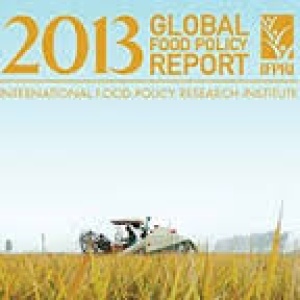
This report by the International Food Policy Research Institute (IFPRI) analyses the major food policy issues and developments in 2013 relating to food and hunger, areas that are crucial in the post-2015 development agenda. The report argues that more ambitious goals have to be set to address the severe problem of hunger and “hidden hunger” (micronutrient deficiencies).
These two problems have to be given equal weight and the IFPRI 2013 Global Food Policy Report therefore discusses:
- What is the direction of the global development agenda as the world approaches the 2015 deadline of the Millennium Development Goals?
- What are the best policies and investments to ensure we can end hunger and undernutrition by 2025?
- How effective will India’s landmark National Food Security Act be in ensuring access to adequate food at affordable prices?
- What policies, investments, and technologies will do the most to sustainably increase agricultural productivity, to link smallholder farmers to markets, and to ensure that their products are safe and nutritious?
- How do we get the politics of nutrition right, to create an environment in which policies promote food and nutrition security?
- What have been the major developments in regions and countries where poor and hungry people reside?
Citation
International Food Policy Research Institute (IFPRI), 2013, 2013 Global Food policy Report
Download the full report here and/or the overview here. IFPRI also welcomes comments and suggestions on the report.
Read more about IFPRI's work here, nutrition here and the debate on sustainable intensification here.
For more discussion of the double burdens of over and undernutrition in relation to a major developing economy, China, see Chapter 5 of the FCRN’s new China report, Appetite for Change, together with the report’s conclusions.







Post a new comment »